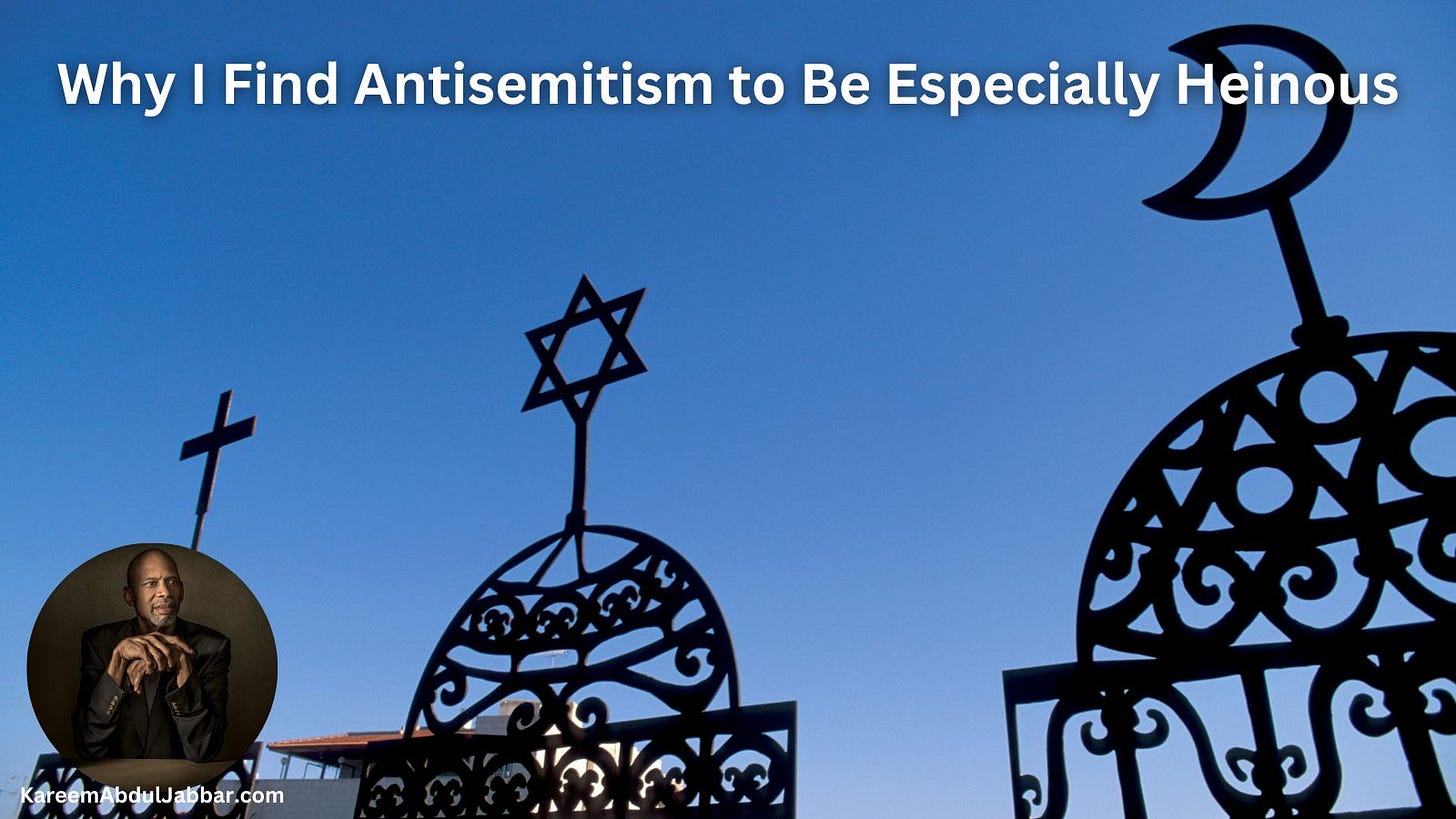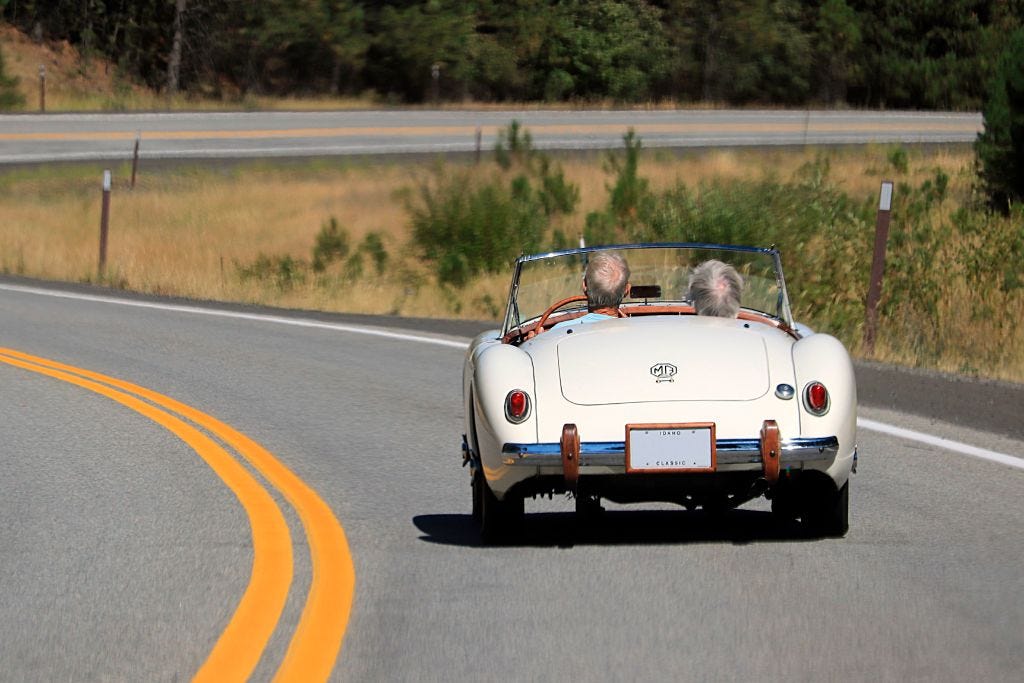Why I Find Antisemitism to Be Especially Heinous and the Whitewashing of Dwayne Johnson Statue
Is GOP Speaker Mike Johnson a Communist?, Verizon Ad Requires Time Machine, Willie Nelson Sings
What I’m Discussing Today:
Kareem’s Daily Quote: All about aging, the mind-body problem, and The Golden Bachelor.
Why I Find Antisemitism to Be Especially Heinous: Yes, it’s hateful and shameful, but it’s also depressing at how lazy, irrational, and unoriginal bigots can be.
Why Was Dwayne Johnson’s Wax Figure Whitewashed? Other than making him White, they did a pretty good job. Their excuse is pretty unconvincing.
Speaker of the House Johnson Announces His Support for Russia and the Wealthy: He wants to cut back the IRS funding as well as funding to Ukraine. Who benefits? Putin and the super-rich.
Kareem’s Media Gripes: The $2,000 Hobo Bag seems entitled and tone-deaf. Verizon’s iPhone ad requires a time machine for it to make sense.
Kareem’s Video Break: Remember getting your first pet? It may be the first time children experience pure unrestrained joy.
Willie Nelson Sings “Always on My Mind”: Willie sings at his soulful, sincere best about regret and redemption.
Kareem’s Daily Quote
An aged man is but a paltry thing,
A tattered coat upon a stick, unless
Soul clap its hands and sing, and louder sing
For every tatter in its mortal dress,
W.B. Yeats, “Sailing to Byzantium”
Since French philosopher Descartes first popularized it, the mind-body problem has always been a darling subject of philosophers, psychologists, and late-night dorm room pizza parties. But aging rips it from the theoretical ether and slaps you upside the head with its stark reality.
As I’ve gotten older, the relationship between my mind and body has become more intense and profound. Cancer, leukemia, and A-fib have forced me into servitude to a decaying body. Sometimes I feel like the real me is slowly peeling away from my body like old, dried wallpaper. Sometimes we are like a doddering old couple who once were in love and now are just roommates silently tolerating each other.
“A tattered coat upon a stick” has been an image that has stayed with me since I first read it as a young man. Back then, it felt like a description of a horror movie monster out to devour our youth. Well, that’s exactly what it is. The zombie mutation is in the blood and those of us who survive into elderly status will become paltry tattered coats upon brittle sticks. It’s inevitable.
But it’s the “unless” part of the poem that I want to focus on today because that’s the part that I focus on in my daily life whenever I feel stick-like.
…unless
Soul clap its hands and sing, and louder sing
For every tatter in its mortal dress
The poem invites the soul in us—that which we think of as our essence apart from the body—to passionately clap its hands and sing to the skies, raising our voice for every “tatter in its mortal dress,” meaning every physical ailment and infirmity. Those “tatters” aren’t our weakness, they’re our strength. They challenge us, sure, but they also force us to place our lives in clear perspective. We are sledding down a hillside that we will never climb up again. So, we must learn to love the sliding, the view, the crisp air, and those cheering us on.
This brings me to the unexpected phenomenon of The Golden Bachelor, which I think is one pop culture example of the soul clapping its hands with gusto and hope. The series roughly follows the format of The Bachelor, with one man “dating” a few dozen women. The main difference is most of the bachelors and women are in their twenties while Gerry Turner, the Golden Bachelor, is 72, and the women he’s dating are in their 60s and 70s.
What surprised most people was that the ratings for this senior version drew 4.1 million viewers on its premiere, up 38% from the premiere of the most recent season of The Bachelor. Shockingly, to the Hollywood execs, America actually does want to see older people.
What sadly isn’t surprising is the ageism involved from the producers. TGB is 60 minutes versus the 90 minutes to two hours of the Young Bachelor. TGB also has only 8 episodes versus 11, and 22 women compared to 30 from the last Bachelor season. As the poem says, we are “paltry things”—and are treated as such.
Aside from that though, there is a life-affirming spirit to the show that humanizes seniors beyond the familiar and insulting stereotypes we usually see on TV. First, the people all have genuine kindness and compassion in them, which is more like The Great British Bake Off. Sure, they have their moments of insecurity and anguish, but there is very little pettiness in them. Second, the stakes couldn’t be higher, which makes their interactions all the more touching. These are people who have suffered great losses in their lives, through death or divorce, some of whom have been alone for many years. When they talk about love, they are talking about a relationship they hope will last a lifetime, which they know is not that long anymore. When Gerry sends one of these women home, they aren’t going straight to their social media to check their DMs, they’re facing a lost chance of not being lonely. This is all the more heartfelt because they don’t have all that many chances.
And yet, throughout the process, the women have played fair with the audience in letting us know who they are. They have not tried to portray themselves as overly youthful either in action or speech. Some are more active than others, but they mostly shrug off that difference. They see value in their age and experience as well as in their bodies. There is a courage to that attitude which is a loud and joyful song "for every tatter in its mortal dress.”
I’m happy that viewers got a chance to see seniors as more than their frailties—to see their passion, their need for love, and their joy at interacting with others.
Perhaps we seniors are tattered coats upon a stick. But we can choose to wear it well.



